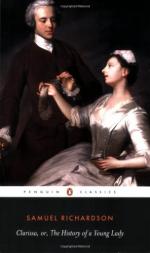Thus far had I written, when the unexpected early return of my servant with your packet (your’s and he meeting at Slough, and exchanging letters) obliged me to leave off to give its contents a reading.—Here, therefore, I close this letter.
LETTER XXXIX
Mr. Lovelace, to John Belford,
Esq.
Tuesday Morn. Aug. 29.
Now, Jack, will I give thee an account of what passed on occasion of the visit made us by Col. Morden.
He came on horseback, attended by one servant; and Lord M. received him as a relation of Miss Harlowe’s with the highest marks of civility and respect.
After some general talk of the times, and of the weather, and such nonsense as Englishmen generally make their introductory topics to conversation, the Colonel addressed himself to Lord M. and to me, as follows:
I need not, my Lord, and Mr. Lovelace, as you know the relation I bear to the Harlowe family, make any apology for entering upon a subject, which, on account of that relation, you must think is the principal reason of the honour I have done myself in this visit.
Miss Harlowe, Miss Clarissa Harlowe’s affair, said Lord M. with his usual forward bluntness. That, Sir, is what you mean. She is, by all accounts, the most excellent woman in the world.
I am glad to hear that is your Lordship’s opinion of her. It is every one’s.
It is not only my opinion, Col. Morden (proceeded the prating Peer), but it is the opinion of all my family. Of my sisters, of my nieces, and of Mr. Lovelace himself.
Col. Would to Heaven it had been always Mr. Lovelace’s opinion of her!
Lovel. You have been out of England, Colonel, a good many years. Perhaps you are not yet fully apprized of all the particulars of this case.
Col. I have been out of England, Sir, about seven years. My cousin Clary was then about 12 years of age: but never was there at twenty so discreet, so prudent, and so excellent a creature. All that knew her, or saw her, admired her. Mind and person, never did I see such promises of perfection in any young lady: and I am told, nor is it to be wondered at, that, as she advanced to maturity, she more than justified and made good those promises.—Then as to fortune—what her father, what her uncles, and what I myself, intended to do for her, besides what her grandfather had done—there is not a finer fortune in the country.
Lovel. All this, Colonel, and more than this, is Miss Clarissa Harlowe; and had it not been for the implacableness and violence of her family (all resolved to push her upon a match as unworthy of her as hateful to her) she had still been happy.




